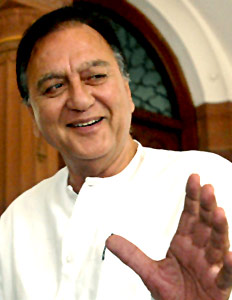
“I didnot dissolve myself only in films. I was very much aware of the problems within my country – because I had come through those problems too – the partition of India had virtually brought us on the footpath. I owe whatever I am today, to the people of my country. I became popular because of them, because of their love for me.I want to do something in return of their love.” - Sunil Dutt in an interview to South Asian. Actor turned producer, director, social activist and then to politician, Sunil Dutt excelled in all the traits. Apart from being a famous actor, he is also known for his work as a social activist.
Personal Life
Sunil Dutt was born on 6th June, 1929 and grew up as as Balraj Dutt. He was born to a zamindar family in village of Khurd in Punjab, now part of Pakistan. He was the 5 years old when his father passed away. Sunil was 18 when he witnessed India Pakistan partition woes, stimulating Hindu Muslim roits. Managing to save their lives, the family settled in a small village in Yamuna Nagar in Haryana. For his higher studies Sunil moved to Mumbai, he took admission at Jai Hind college in Mumbai to complete his graduation. Sunil Dutt had three children, Sanjay Dutt, Priya Dutt and Namrata Dutt. His son Sanjay Dutt is also a successful actor in Bollywood. His elder daugther Priya Dutt is Indian Congress Party worker and was elected in 15th LokSabha in 2009 from Mumbai North Central constituency. His youngest daughter Namrata Dutt is married to Kumar Gaurav. Kumar Gaurav is the son of old time actor Rajendra Kumar who has shared onscreen presence with Sunil Dutt in 'Mother India'.
Professional life
Along with his graduation, Sunil also started working as a Radio show host for Hindi version of Radio Ceylon. Radio Ceylon was a renowned and oldest radio station an South Asia and got him the popularity of a celebrity interviewer and host. It was during on of the celebrity interview that he first met Nargis.
In 1955, Sunil Dutt got chance to showcase his acting skills in 'Railway Platform'. He was offered the role of hero by the director Ramesh Saigal opposite Nalini Jayawant. In 1956 director B.R. Chopra signed him in a lead role for 'Ek Hi Raata' and thus began seven film long association with B. R. Chopra. He signed movie 'Mother India'(1958) which proved to be a breakthrough in his career. He played the role rebellious young man and Nargis played the role of his mother. It was at the sets of this film that they fell in love and got married on 11th March, 1958.
After the huge success of 'Mother India' Sunil Dutt worked on changing his image from a angry rebellious man to a romantic hero. He worked on movies that were female oriented and films that portrayed him in romantic roles. 1950s and 1960s proved to be very successful years in his career with hits like Sadhna (1958), Sujata (1959), Mujhe Jeene Do (1963), Gumraah (1963), Waqt (1965), Khandaan (1965), Milan (1967), Padosan (1967) and Humraaz (1967).
The milestone in his life was in year 1963 when he turned producer and produced Yeh Rasste Hain Pyar Ke and Mujhe Jeeno Do. Sunil Dutt produced Man Ka Meet (1968), through which his younger brother Som Dutt started his career in Hindi films. Reshma and Shera (1971), a big budget movie, was produced, directed and starred Sunil Dutt, was a unsuccessful at the box office.
In 1981, Sunil Dutt produced and directed 'Rocky' to introduce his son Sanjay Dutt in films. Soon after the release of 'Rocky', the life of Sunil Dutt was swayed by the death of his wife Nargis due to pancreatic cancer. In the memory of his wife he started Nargis Dutt foundation to extend medical help to cancer patients.
He was appointed as 'Sheriff of Mumbai' in 1982. This title is presented by Maharastra Givernment for a period of one year. In 1995, he was given Filmfare Lifetime Achievement award. Sunil Dutt joined Indian Congress Party in 1984 and represented Mumbai North West constituency. He was first elected in 1984 and was re-elected in 1989 and 1991. He took a break from his political career to support his son Sanjay, who was on trial for being involved in Hindu Muslim violence case.
Post his son's release, Dutt contested in 1999 election from the same constituency and won. He was re-elected in 2004 and became cabinet minister for youth affairs and sports in Manmohan singh's government. He returned to movies in 2003 and acted along with his son in Munnabhai M.B.B.S. This was his last movie before his death in 2005 because of heart attack.
For his contribution to Indian Films he was conferred with awards for outstanding appearance on lead role and lifetime achievement awards. He won accolades including the Padmashree in 1968, the Maulana Abul Kalam Azad Award for National Integration and Communal Harmony in 1997, the Khan Abdul Gaffar Khan Award for International Peace, Communal Harmony, Unity and National Integration in 1997 and the Rajiv Gandhi National Sadbhavana Award in 1998.